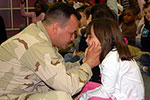 In a commentary, Stephen J. Cozza, M.D., from the Uniformed Services University School of Medicine in Bethesda, Md., provides perspective on the scope of U.S. military deployment and the population it touches. For additional background information see, “Length Of Parental Military Deployment Associated With Children’s Mental Health Diagnoses.”
In a commentary, Stephen J. Cozza, M.D., from the Uniformed Services University School of Medicine in Bethesda, Md., provides perspective on the scope of U.S. military deployment and the population it touches. For additional background information see, “Length Of Parental Military Deployment Associated With Children’s Mental Health Diagnoses.”
As of 2009, he notes, 44 percent of active duty military members have children (for a total of 1.2 million children), as well as 43 percent of Reserve and National Guard members. Furthermore, since combat operations began in 2001, roughly 2 million U.S. military personnel have deployed at least once.
The article by Mansfield and colleagues, writes Cozza, provides “an important contribution to our understanding of a child’s health and its relationship to parental combat deployment.” The study, he adds, appears to confirm earlier research into this topic. But it also raises questions, such as what long-term consequences, if any, deployments have on children’s health and development.
Cozza recommends that these findings be used to raise national awareness of the problem, both within the military community and without. Since affected children are likely to at some point receive care outside the military health system, he urges civilian clinicians to pay special attention to these patients.
“Brief screening for anxiety, depression, behavioral problems, academic difficulties, peer relational problems, or high-risk behaviors (such as substance misuse or unsafe sexual practices) is warranted and will help identify treatment needs,” Cozza concludes.
Material adapted from JAMA.
Reference
Arch Intern Med. Published online July 4, 2011. doi:10.1001/archpediatrics.2011.117.
No comments yet.